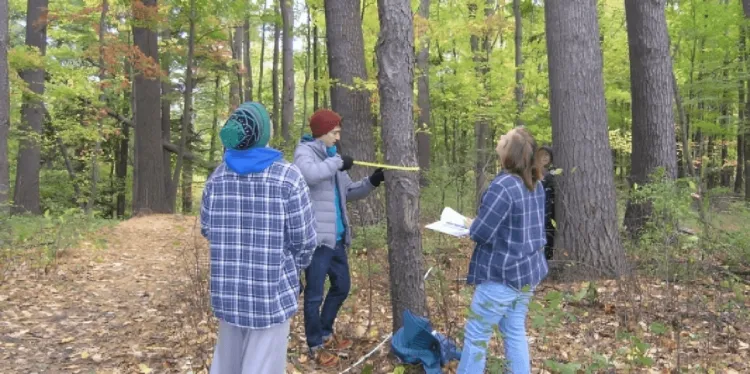BioCore provides life science basics for ten UVM majors.

The BioCore curriculum consists of a series of introductory biology courses covering all aspects of basic biology, including molecular biology, physiology, biodiversity, genetics, ecology, and evolution. This interdisciplinary series, jointly run by the Colleges of Arts and Sciences (CAS) and Agriculture and Life Sciences (CALS), serves majors primarily in Animal Science, Biochemistry, Biological Science, Biology, Environmental Science, Microbiology, Molecular Genetics, Neuroscience, Plant Biology, Sustainability, Ecology, and Policy, Wildlife and Fisheries Biology, and Zoology, as well as students in the Post-Baccalaureate Pre-Medical program.
For first-year students, the BioCore program offers small lecture sizes (48 students maximum) to promote interaction with professors and to facilitate the transition between high school and college-level science. Explore all BioCore Courses and current offerings.
BioCore (BCOR) Courses and Semesters Offered:
| Course | Credits | Semester |
|---|---|---|
| BCOR 1400 (formerly 011): Exploring Biology 1 | 4 | Fall, Summer |
| BCOR 1450 (formerly 012): Exploring Biology 2 | 4 | Spring, Summer |
| BCOR 1425 (formerly 021): Accelerated Biology | 4 | Fall |
| BCOR 2300 (formerly 101): Genetics | 3 | Fall, Spring, Summer |
| BCOR 2100 (formerly 102): Ecology & Evolution | 4 | Fall, Spring |
| BCOR 2500 (formerly 103): Molecular & Cell Biology | 4 | Fall, Spring |
| BCOR 2505: Molecular & Cell Biology, lecture only | 3 | Fall, Spring |
| BCOR 3000 (formerly 189): Biology in Practice | 1 | Fall, Spring |
| BCOR 4994 (formerly 197): Undergraduate Teaching Assistantship | 1 | Fall, Spring |
| BCOR 2995/3995 (formerly 198/298): Undergraduate Research | 1-18 | Fall, Spring |
High School Biology credits
Advanced Placement (AP) Biology and some International Baccalaureate (IB) credits can be applied to the Biology majors (Biology BA, Biological Science BS, Zoology BA/BS). Students with an AP Biology score of 5 (or equivalent IB credit) will have fulfilled their major's general biology requirement and will be invited to join BCOR 2300: Genetics. Students with an AP Biology score of 4 will be invited to enroll in BCOR 1425: Accelerated Biology, a one-semester alternative to the BCOR 1400/1450: Exploring Biology series. It will be the student's choice to enroll in these advanced courses, or take the BCOR 1400/1450 series to solidify their general biology background.
Learning Goals of the BioCore Series
Following completion of introductory level BioCore courses, students will be able to:
- Articulate how biological processes work using the appropriate terminology.
- Recognize and employ mathematical formulations of biological processes and interpret results.
- Identify hierarchical relationships in biology.
- Recognize steps of the scientific method.
- Convert data into a summary figure, identify pattern, and use pattern to support a conclusion
Following completion of intermediate-level BioCore courses, students will be able to:
- Apply the process of science through observation, experimentation, and hypothesis testing, and draw inferences from biological datasets to develop conclusions.
- Compare the different levels of biological organization in a biological system from micro- to macroscopic.
- Examine a biological system using a quantitative approach.
- Evaluate and articulate the contribution of biology to society.
BioCore (BCOR) Student Support
Academic support
If you are having trouble in a BioCore (BCOR) course, there are two avenues of support beyond meeting with your instructor or Teaching Assistant.
- Tutoring: UVM's Center for Academic Success offers free tutoring to all undergraduate students. Through the Tutoring Center, students set up appointments with peer tutors.
- Supplemental Instruction (SI): Supplemental Instruction (SI) is a drop-in, free, voluntary, group-based study system led by an upperclass student who has already taken (and done well in!) the course. Each session is different, and statistics show that students who participate regularly have a better understanding of the material and receive higher grades. SI is offered for Exploring Biology, Genetics, Ecology & Evolution (Fall only) and Molecular & Cell Biology. The SI instructor will have posted study session information on the course BrightSpace page.
Personal Support
If you are enrolled in a BCOR course and are having personal difficulties that are preventing you from attending class or completing work, please contact any or all of the following: the course instructor, your advisor, the BioCore program co-directors, and the Student Services office for your College (links below). Student Services will have a procedure for documenting student illnesses and other emergencies and will review your situation and inform course faculty via email as to whether any accommodations should be made.